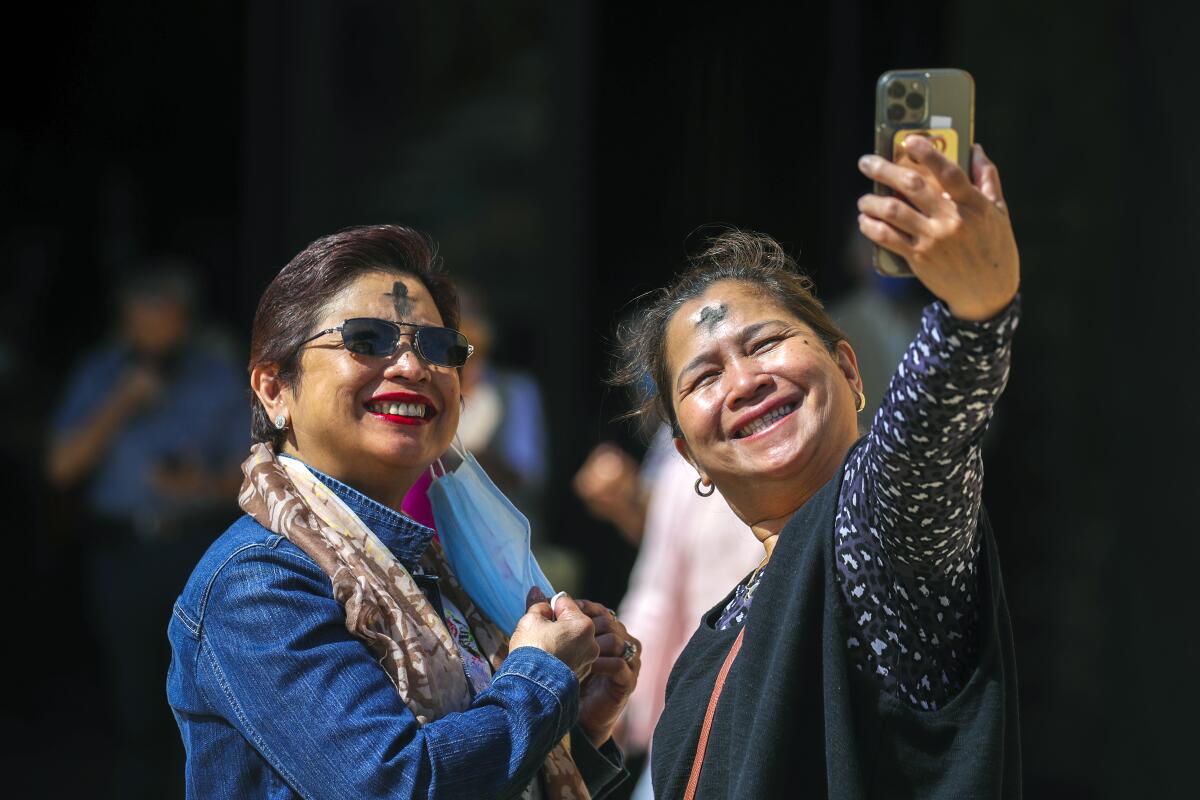It’s Valentine’s Day and Ash Wednesday. What’s a Catholic to do?

- Share via
Wednesday is Valentine’s Day, a holiday widely observed by indulging in something romantic and sweet with the person you love. But many Catholics and other Christians across Southern California will be receiving a cross made of ash on their foreheads that day because it’s Ash Wednesday, whose vibe is anything but indulgent.
How are you supposed to reconcile those two observances? The guidance depends on which religious institution you speak to.
For the record:
10:42 a.m. Feb. 14, 2024An earlier version of this story stated that Ash Wednesday was a holy day of obligation for Catholics. They are not required to attend Mass that day.
In the Catholic Church, Ash Wednesday is intended to remind us of our mortality and the need for reconciliation with God. It also marks the beginning of the penitential Lenten season.
On Wednesday, practicing Catholics fast, abstain from eating meat (on every Friday for six weeks afterward as well) and choose a favorite food or pursuit, such as candy or alcoholic beverages, to avoid for 40 days.
Fasting and avoiding meat could hamper some Valentine’s plans, but religious leaders told The Times that parishioners can still celebrate the day without breaking their Lenten obligations.
When fasting — which in the Catholic Church means having only one full meal and two snacks that do not add up to a full meal — you could have the Valentine’s dinner as your meal, said Dorian Llywelyn, director for Ignatian Spirituality at Loyola Marymount University.
“Ash Wednesday is far more important than Valentine’s Day because [the latter] is a modern development and mostly commercial,” Llywelyn said.
In the past, religious leaders have issued a dispensation or exemption from certain aspects of Ash Wednesday in order to participate in a cultural celebration. For example, when Ash Wednesday and Lunar New Year fell on the same day in 2005.
Cardinal Roger M. Mahony of the Los Angeles Archdiocese issued a statement saying those who wished to celebrate Lunar New Year that day could perform their Ash Wednesday obligation of fasting on Saturday.
The archdiocese isn’t cutting parishioners any slack this year, however.
Valentine’s Day isn’t a cultural holiday, Father Juan Ochoa of the Archdiocese of Los Angeles said. The original Saint Valentine, a third-century Roman martyr, was honored in the Catholic Church’s liturgical calendar until 1969, Ochoa said, when the church gave the Feb. 14 feast day instead to Sts. Cyril and Methodius, brothers who are credited with devising the Glagolitic alphabet to transcribe scripture.
St. Cyril died on Feb. 14, 869, hence his claim to that date.
St. Valentine was a Roman priest who married people against their parents’ wishes and generally performed secret weddings because the couples loved each other, Ochoa said.
“Valentine’s Day is about love and Ash Wednesday is about preparing ourselves to celebrate the passion and resurrection of Jesus Christ, [so] it’s also about love,” he said.
Worship services are also held on Ash Wednesday in Anglican, Lutheran, Episcopal and some Protestant churches.
The Rev. Canon Melissa McCarthy of the Episcopal Diocese of Los Angeles said her church’s advice is to get your ashes and then go celebrate Valentine’s Day with the person you love, whomever that person may be.
As an alternative to giving up an indulgence, McCarthy said one possibility might be to take on a new spiritual practice, such as meditation, doing a centering prayer or attending Bible study.
Although Catholics aren’t obliged to receive ashes or attend Mass on Wednesday, the Catholic Conference of Bishops says they are required from age 14 on to abstain from meat and, from age 18 to 59, to fast.
While many parishioners in the Episcopal Church participate, McCarthy’s hope is that people also see it as a way “to take stock of where you are in your life, relationships and relationship with God.”
More to Read
Sign up for Essential California
The most important California stories and recommendations in your inbox every morning.
You may occasionally receive promotional content from the Los Angeles Times.














